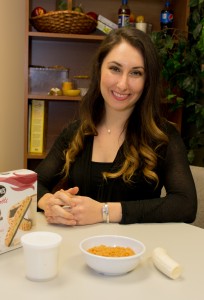by Eliana Lakritz MS RD LDN, Clinical Dietitian, Baystate Noble Hospital
It is normal to experience indigestion occasionally, especially after a large meal or eating spicy, irritating foods. However, if you frequently experience indigestion, heartburn, discomfort in the esophagus, or chest pains after eating, you could be suffering from gastroesophageal reflux disease (GERD). GERD is quite common, affecting about 20% of the U.S. population. While it can be uncomfortable, there are some modifications you can make to reduce the symptoms. You do have some control over it! Some people may even be able to control GERD with diet alone.
The Basics: GERD is caused by low in pressure or weakness of a sphincter within the esophagus. The weakened sphincter inappropriately allows stomach acid, previously eaten food and/or fluids to regurgitate back into your esophagus or mouth (acid reflux). If left untreated, GERD can lead to erosion of teeth enamel from stomach acid, esophageal cancer, or esophageal inflammation. Complications may cause pneumonia.
The Diagnosis: If are experiencing these symptoms and you think you may have GERD, talk to your doctor. GERD can be diagnosed based on symptoms, but sometimes requires further testing and/or imaging.
The Treatment: Foods that worsen GERD symptoms are often different from person to person. However, there are some common foods that often cause reflux and should be avoided if they worsen your symptoms.
- Foods to avoid: Fatty foods such as ice cream, fried foods, pastries, foods cooked with oil or butter, pizza, or high fat dairy usually sit in your stomach for a longer period of time and cause reflux. Consider choosing lean proteins, dairy, and foods prepared without added fat. Mint, caffeine, acidic, and spicy foods are foods that often exacerbate GERD as well. Specifically, avoid tomato/tomato sauce, orange juice, citrus fruit, vinegar, coffee, and hot peppers and spices.
- Timing of Meals/Snacks: Eating just before bed, when you lie down flat, can make reflux more likely. Try smaller, more frequent meals instead of large meals too so that your stomach is not filled to capacity.
- Keep a food log: As mentioned before, GERD is different for everyone. Keeping a food journal may help you identify which foods worsen your GERD. This way, you can avoid your trigger foods in the future and prevent complications.
- Medication: If lifestyle changes don’t work by themselves, medication can be added. Many of the prescribed medications can lower your ability to absorb iron and vitamin B12, so make sure these are being checked if you do get put on meds.
If you are interested in learning more about nutrition counseling sessions with a registered dietitian at Baystate Noble Hospital, please call 413-568-2811 ex: 5671 for more information.









